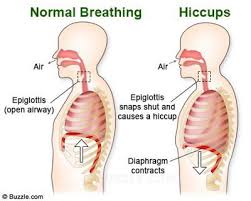Hiccups are generally harmless. For most people, they come and go unexpectedly and are more an annoyance than anything. However for some people, hiccups can be serious. While it’s very rare, some people can get persistent hiccups. Persistent hiccups are categorized as hiccups that last more than 48 hours. Hiccups that last more than two months are called intractable, or hard to manage. However, these types of hiccups are extremely rare, and for now I want to focus on only the simpler cases.
My relationship with hiccups can best be described by the old saying “When it rains, it pours.” I don’t hiccup all that often, but when I do I can usually count on a rapid succession. For years I’ve wondered: “Where do these even come from? What part of my body is responsible for this?”
The body part to blame is the diaphragm.
The diaphragm is responsible for providing the body its’ proper flow of oxygen. It almost always works flawlessly, without you even having to think about it. But like any body part, sometimes the diaphragm can become irritated. If this happens, one might suck air into their throat suddenly. If this trapped air hits you’re voice box, you are left with a hiccup! This can be due to swallowing too much air, but also occurs from: overeating, the carbonation in drinks like soda, and many other factors.
Hiccups are often sudden and involuntary. When the diaphragm muscles contract, the opening between your vocal cords is snapped shut to check the inflow of air and your left making a “hiccup” sound.
According to research, another major cause of hiccups is injury/irritation to the phrenic nerve or the vagus. The phrenic nerve and the vagus help control the movement of one’s diaphragm. If these parts are hurt or irritated, it’s very easy to notice the trickle down effect on the diaphragm.
Other research has also linked the CNS (central nervous system) to hiccups. The CNS, or the brain and spinal cord, are accountable for just about all of the human functions. If either of these body parts take damage, a person could lose the ability to control hiccups.
To me, it’s clear that hiccups are caused by a number of things- many which revolve around the irritation of one’s diaphragm.
There are many famous remedies for hiccups. Some of the most classic examples include being scared by somebody else, chugging a glass of water, and swallowing a mouth full of sugar. Here is a list of what are considered the five most effective ways to deal with hiccups:
Being scared- badly
Drinking an entire glass of water without stopping
Eating a big spoonful of peanut butter
Drinking a couple sips of hot sauce
Breathing slowly into and out of a brown paper bag
Works Cited:
http://www.rd.com/health/wellness/9-quick-cures-for-hiccups/
http://articles.mercola.com/sites/articles/archive/2016/01/09/what-causes-hiccups.aspx
http://www.mayoclinic.org/diseases-conditions/hiccups/basics/causes/con-20031471



I remember asking my sixth grade science teacher this once during class and her being unable to provide me with an answer. I don’t blame her, since the answer is a little complicated for eleven-year-olds. I also tend to have violent hiccup attacks when I do hiccup, although I also sometimes have a random single hiccup after I eat or drink something. What I’m most interested in, though, is why the remedies (seem to) work. The one I am most familiar with is holding your breath, which never works for me, and if hiccups are caused by trapped air in the diaphragm I’m curious as to why people think trapping more air could cure the initial ailment. Some of the remedies you can guess at the reasoning behind, since most of them deal with moving air or other substances through your airways, likely to clear out the trapped air or soothe irritation. However, I still have never heard of scientific reasoning behind these cures and wondered if there have been any experiments regarding them. Sadly, I was unable to find any such experiments, so I suppose we’ll just have to try one remedy at a time, until we find a solution that works for ourselves.
I did find one article that suggested a rather amusing and mature solution. Perhaps it’s not as popular because of the method involved.